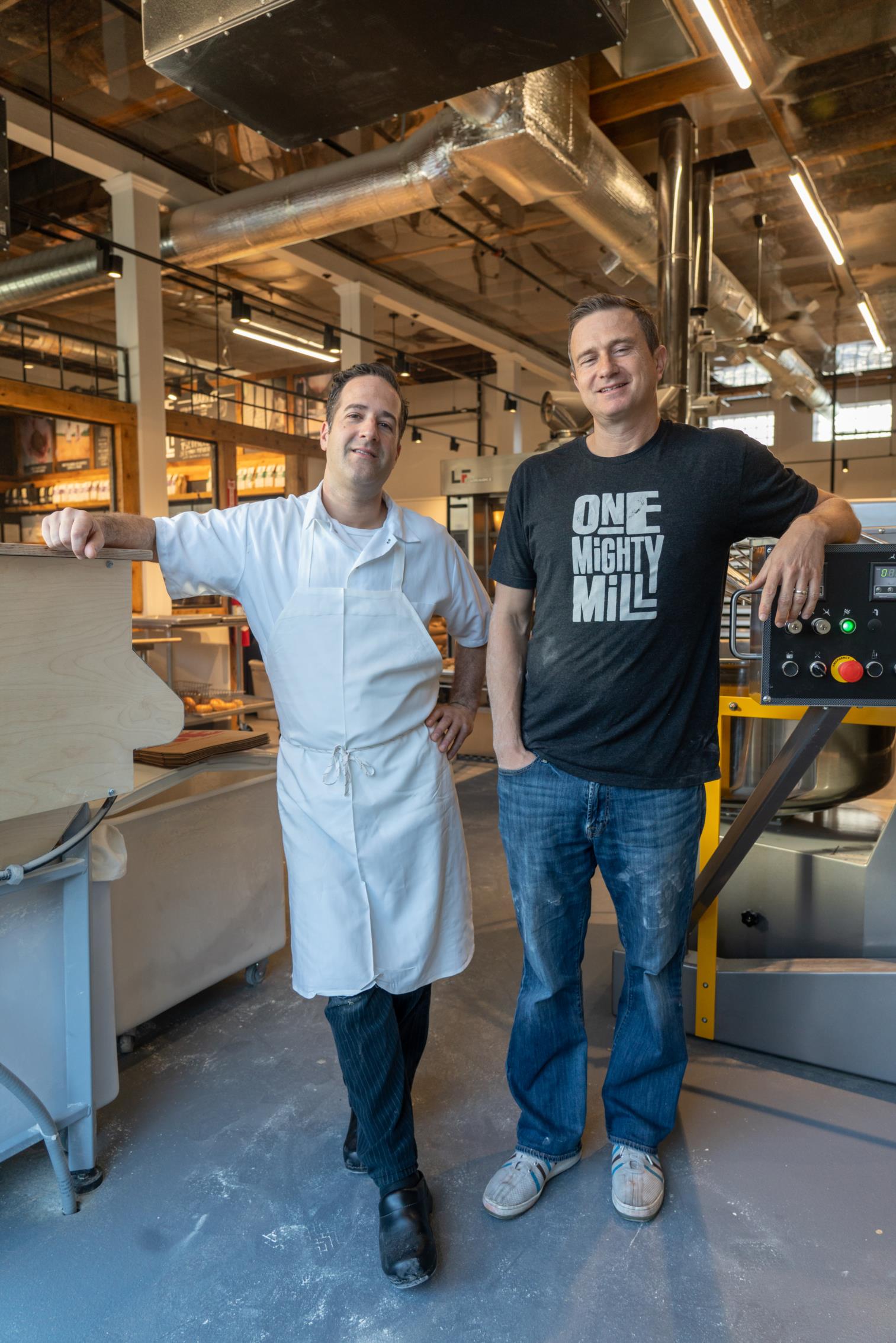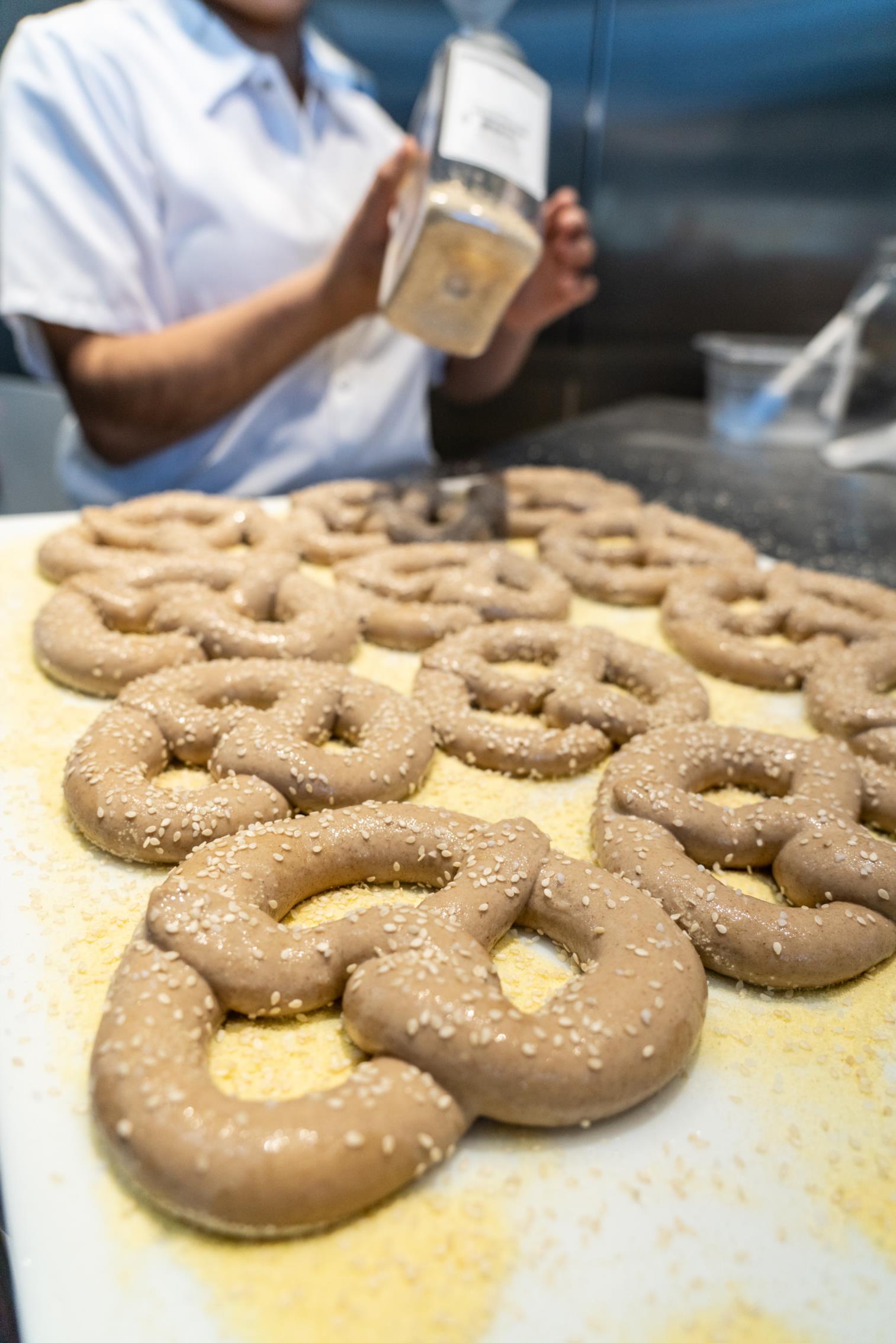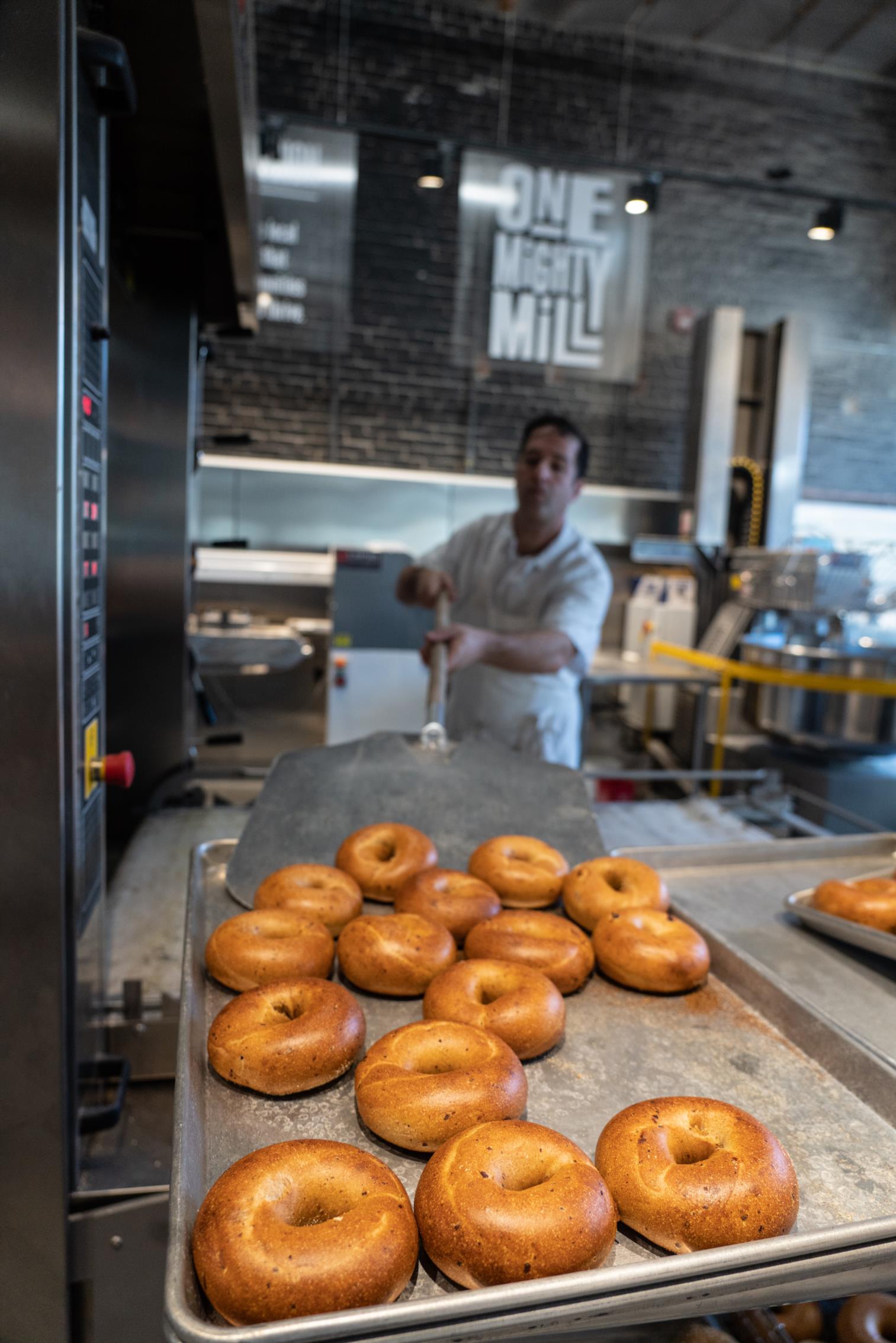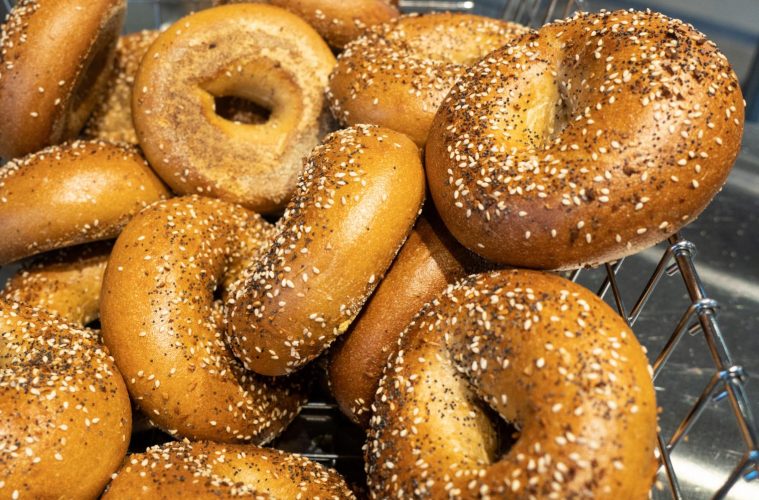 Jon Olinto, co-founder of One Mighty Mill, a new bakery and flour mill in Lynn, has been thinking about wheat a lot lately. Back in 2004, Olinto was one of the founders of the Boston-based B. GOOD farm-to-table burger chain, which is rooted in sourcing seasonally and locally. He says that while he could tell you exactly where the fast-casual chain’s potatoes and ground beef were farmed, the rolls were something of a mystery. The bread was locally baked, but the flour was hard to nail down.
“We literally knew nothing about the farm supporting that baker,” Olinto says. And once he started exploring, he didn’t like what he found: Commercially available wheat is mostly grown in the Midwest, with heavy use of pesticides and more concern for shelf life than for nutritional composition.
Jon Olinto, co-founder of One Mighty Mill, a new bakery and flour mill in Lynn, has been thinking about wheat a lot lately. Back in 2004, Olinto was one of the founders of the Boston-based B. GOOD farm-to-table burger chain, which is rooted in sourcing seasonally and locally. He says that while he could tell you exactly where the fast-casual chain’s potatoes and ground beef were farmed, the rolls were something of a mystery. The bread was locally baked, but the flour was hard to nail down.
“We literally knew nothing about the farm supporting that baker,” Olinto says. And once he started exploring, he didn’t like what he found: Commercially available wheat is mostly grown in the Midwest, with heavy use of pesticides and more concern for shelf life than for nutritional composition.
 “If you learn what the process is, you will instantly understand the way wheat has been industrialized,” Olinto says, explaining that these days, mills separate the starchy “endosperm”—the fluffy white part that contains gluten—from the fiber-rich bran and the vitamin- and mineral-packed germ so that flour can sit on store shelves indefinitely. Even items billed as “whole wheat” and “whole grain” are often reconstituted with additives after the fact, rather than coming from the unadulterated crushed whole grain.
“If you learn what the process is, you will instantly understand the way wheat has been industrialized,” Olinto says, explaining that these days, mills separate the starchy “endosperm”—the fluffy white part that contains gluten—from the fiber-rich bran and the vitamin- and mineral-packed germ so that flour can sit on store shelves indefinitely. Even items billed as “whole wheat” and “whole grain” are often reconstituted with additives after the fact, rather than coming from the unadulterated crushed whole grain.
 So Olinto and co-founder Tony Rosenfeld, expanding on their time together at B. GOOD, decided to launch One Mighty Mill, selling freshly ground, sustainably sourced flour and baked goods. Working with farmers in Maine, close to the Canadian border, One Mighty Mill is supporting the transition of hundreds of acres of wheat from conventional to organic, and then transporting that grain to Lynn, where they grind it into flour. From there, with Rosenfeld overseeing the kitchen, they package the freshly milled flour for sale, as well preparing everything from bagels to cookie dough for sale at their storefront coffee shop and in select Roche Bros. supermarkets and an expanding number of Massachusetts Whole Foods locations.
The Lynn café offers an ever-changing array of fresh bagels, dense and nutty, topped with everything from strawberry preserves to hummus, along with tortillas, wraps and pretzels. The to-go section includes cookie dough and pizza dough for home baking, as well as freshly ground flour.
So Olinto and co-founder Tony Rosenfeld, expanding on their time together at B. GOOD, decided to launch One Mighty Mill, selling freshly ground, sustainably sourced flour and baked goods. Working with farmers in Maine, close to the Canadian border, One Mighty Mill is supporting the transition of hundreds of acres of wheat from conventional to organic, and then transporting that grain to Lynn, where they grind it into flour. From there, with Rosenfeld overseeing the kitchen, they package the freshly milled flour for sale, as well preparing everything from bagels to cookie dough for sale at their storefront coffee shop and in select Roche Bros. supermarkets and an expanding number of Massachusetts Whole Foods locations.
The Lynn café offers an ever-changing array of fresh bagels, dense and nutty, topped with everything from strawberry preserves to hummus, along with tortillas, wraps and pretzels. The to-go section includes cookie dough and pizza dough for home baking, as well as freshly ground flour.
 Opening in Lynn was no accident, Olinto says, adding that residents get 15 percent off any purchase. While the community support has been outstanding, the opportunity to contribute to revitalizing a city was important. “We want to be in a community where we can make a difference,” Olinto says. “This enables us to make change on a lot of levels.” A steady stream of locals and folks from area towns pop into the shop to grab a bite and gawk at the fancy bagel oven, alongside a pair of 1,200-pound granite stones used to crush the wheat berries into flour, on the other side of the glass wall separating the café from the production facility.
The whole business is in service to the mill, which makes a building-rattling noise when the machinery groans to life. This cacophonous old-school method retains the maximum health benefits, Rosenfeld says, creating wheat that is more easily digestible. In fact, the tagline for One Mighty Mill is “Wheat you can eat.” “The good fats and flavor removed [by conventional methods] are a component of digestion and nutrition that was always meant to be there,” explains Rosenfeld, who is also the company’s baker-in-chief.
While the flour may look different and taste different, Rosenfeld says One Mighty Mill’s flour should behave the same as conventional white flour in any home recipe, while adding a bit of a different flavor and texture—and perhaps even better digestibility. While the evidence thus far is anecdotal, the business partners think the industrialization of wheat may be responsible for the uptick in folks who avoid it. “Every day people come in and say they can’t eat gluten, but they can eat our products,” Olinto says.
This leaves One Mighty Mill with a steep uphill battle. Convincing people that gluten can be good for you is no small task. But the partners are ready to change minds, bite by delicious bite.
One Mighty Mill, 68 Exchange St., Lynn, 781-584-8648, onemightymill.com
Opening in Lynn was no accident, Olinto says, adding that residents get 15 percent off any purchase. While the community support has been outstanding, the opportunity to contribute to revitalizing a city was important. “We want to be in a community where we can make a difference,” Olinto says. “This enables us to make change on a lot of levels.” A steady stream of locals and folks from area towns pop into the shop to grab a bite and gawk at the fancy bagel oven, alongside a pair of 1,200-pound granite stones used to crush the wheat berries into flour, on the other side of the glass wall separating the café from the production facility.
The whole business is in service to the mill, which makes a building-rattling noise when the machinery groans to life. This cacophonous old-school method retains the maximum health benefits, Rosenfeld says, creating wheat that is more easily digestible. In fact, the tagline for One Mighty Mill is “Wheat you can eat.” “The good fats and flavor removed [by conventional methods] are a component of digestion and nutrition that was always meant to be there,” explains Rosenfeld, who is also the company’s baker-in-chief.
While the flour may look different and taste different, Rosenfeld says One Mighty Mill’s flour should behave the same as conventional white flour in any home recipe, while adding a bit of a different flavor and texture—and perhaps even better digestibility. While the evidence thus far is anecdotal, the business partners think the industrialization of wheat may be responsible for the uptick in folks who avoid it. “Every day people come in and say they can’t eat gluten, but they can eat our products,” Olinto says.
This leaves One Mighty Mill with a steep uphill battle. Convincing people that gluten can be good for you is no small task. But the partners are ready to change minds, bite by delicious bite.
One Mighty Mill, 68 Exchange St., Lynn, 781-584-8648, onemightymill.com

